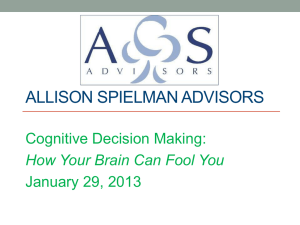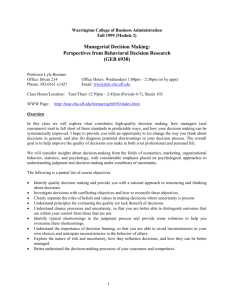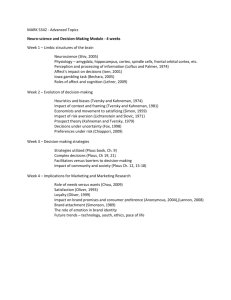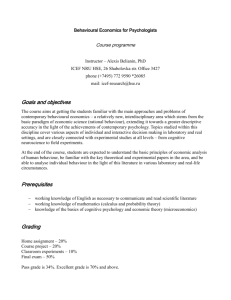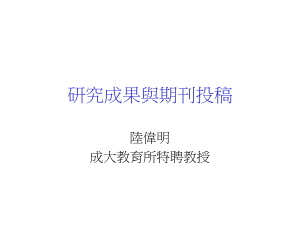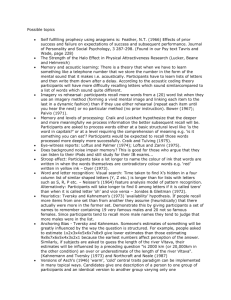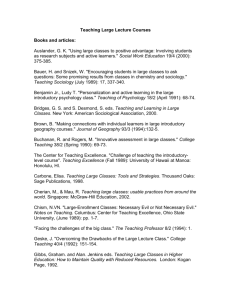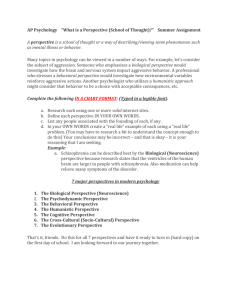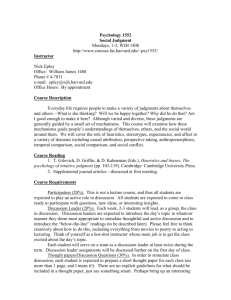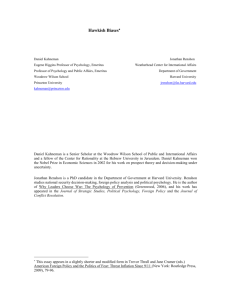Social Psychology Issues in SPM
advertisement
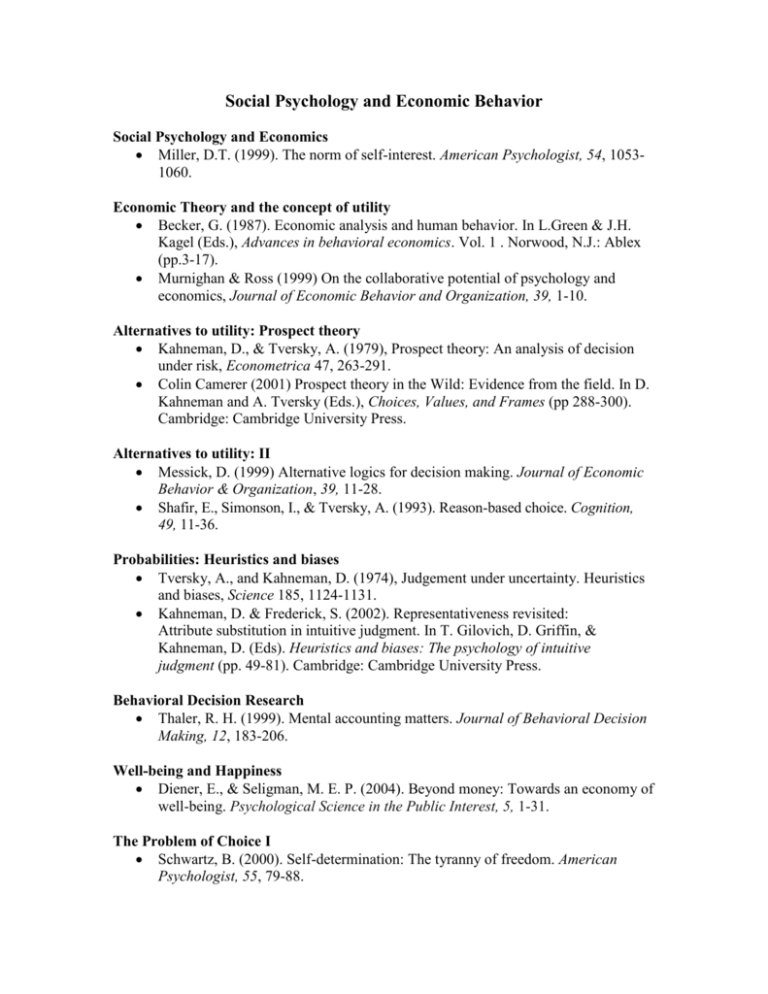
Social Psychology and Economic Behavior Social Psychology and Economics Miller, D.T. (1999). The norm of self-interest. American Psychologist, 54, 10531060. Economic Theory and the concept of utility Becker, G. (1987). Economic analysis and human behavior. In L.Green & J.H. Kagel (Eds.), Advances in behavioral economics. Vol. 1 . Norwood, N.J.: Ablex (pp.3-17). Murnighan & Ross (1999) On the collaborative potential of psychology and economics, Journal of Economic Behavior and Organization, 39, 1-10. Alternatives to utility: Prospect theory Kahneman, D., & Tversky, A. (1979), Prospect theory: An analysis of decision under risk, Econometrica 47, 263-291. Colin Camerer (2001) Prospect theory in the Wild: Evidence from the field. In D. Kahneman and A. Tversky (Eds.), Choices, Values, and Frames (pp 288-300). Cambridge: Cambridge University Press. Alternatives to utility: II Messick, D. (1999) Alternative logics for decision making. Journal of Economic Behavior & Organization, 39, 11-28. Shafir, E., Simonson, I., & Tversky, A. (1993). Reason-based choice. Cognition, 49, 11-36. Probabilities: Heuristics and biases Tversky, A., and Kahneman, D. (1974), Judgement under uncertainty. Heuristics and biases, Science 185, 1124-1131. Kahneman, D. & Frederick, S. (2002). Representativeness revisited: Attribute substitution in intuitive judgment. In T. Gilovich, D. Griffin, & Kahneman, D. (Eds). Heuristics and biases: The psychology of intuitive judgment (pp. 49-81). Cambridge: Cambridge University Press. Behavioral Decision Research Thaler, R. H. (1999). Mental accounting matters. Journal of Behavioral Decision Making, 12, 183-206. Well-being and Happiness Diener, E., & Seligman, M. E. P. (2004). Beyond money: Towards an economy of well-being. Psychological Science in the Public Interest, 5, 1-31. The Problem of Choice I Schwartz, B. (2000). Self-determination: The tyranny of freedom. American Psychologist, 55, 79-88. Iyenigar, S.S. & Lepper, M.R. (2000). When choice is demotivating: Can one desire too much of a good thing. Journal of Personality and Social Psychology, 79, 995-1006.. The Problem of Choice II Carmon, Z., Wertenbroch, K., & Zeelenberg, M. (2003). Option attachment: when deliberating makes choosing feel like losing. Journal of Consumer Research, 30, 15-29. Schwartz, B., Ward, A., Monterosso, J., Lyubomirsky, S., White, K., & Lehman, D. R. (2002). Maximizing versus satisficing: Happiness is a matter of choice. Journal of Personality and Social Psychology, 83, 5, 1178–1197. Markets McGraw, P., & Tetlock, P.E. (2005). Taboo trade-offs, relational framing, and the acceptability of exchanges Journal of Consumer Psychology, 15, 2-15. Kahneman, D., Knetsch, J.L., & Thaler, R.H. (1991). The endowment effect, loss aversion, and status quo bias. Journal of Economic Perspectives, 5, 193-206. Heyman, J., & Ariely, D. (2004). Effort for payment: A tale of two markets Psychological Science, 15, 787-793. Sanctioning and reward Van Dijk, E., & Tenbrunsel, A. (in press). The battle between self-interest and fairness in bargaining: Ultimatum, dictator, and delta games. In Research in Social Issues in Management. Series Editors: S.W. Gilliland, D. D. Steiner, & D. P. Skarlicki. Greenwich CT: Information Age Publishing. Pieters R.G.M. (1989). A note on costs in economic psychology. Journal of Economic Psychology, 10, 441-455. Social factors Ariely, D. & Levav, Y. (2000). Sequential choice in group settings: Taking the road less traveled and less enjoyed. Journal of Consumer Research, 27, 279-290. Higgins, E. T. (2002). How self-regulation creates distinct values: The case of promotion and prevention decision making. Journal of Consumer Psychology, 12, 177-191 Behavioral Game Theory Frank, R.H., Gilovich, T., & Regan, D.T. (1993). Does studying economics inhibit cooperation? Journal of Economic Perspectives, 7, 159-171. Camerer C. (1997). Progress in behavioral game theory. Journal of Economic Perspectives, 11, 167-199. Books Baron, J., (2000), Thinking and Deciding, 3rd ed, Cambridge University Press. Camerer, C. (2003), Behavioral Game Theory, Princeton: Princeton University Press. [Superb overview of experimental studies on games, including recent theoretical developments] Frank, R. (1986). Passion within reason. Frank, R. (19??). Choosing the right pond. New York: Free Press. Frank, R. (1999). Luxury Fever. New York: Free Press. Gigerenzer, G., and Selten, R. (eds.), Bounded Rationality. The Adaptive Toolbox, MIT Press. [An interesting approach to bounded rationality that moves a little further away from the standard rational choice model than much other work does.] Roth, A. and Kagel, J. (eds.) (1995), Handbook of Experimental Economics, Princeton University Press. [Excellent book. Six chapters with thorough overviews of experimental research in different fields.] Edited books Camerer, C., Loewenstein, G., Rabin, M., (eds.) (2004), Advances in Behavioral Economics, Princeton University Press. [Good selection of quality papers in BE, most of them previously published.] Gilovich, T., Griffin, D., & Kahneman, D. (Eds). (2002). Heuristics and biases: The psychology of intuitive judgment. Cambridge: Cambridge University Press. [Excellent sequel of Kahneman, Slovic and Tversky (1982)..] Kahneman, D., Tversky, A. (eds.) (2000), Choices, Values, and Frames, Cambridge University Press. [Selection of 42 excellent papers, many of them classics.] Kahneman, D., Slovic, P., Tversky, A. (eds.) (1982), Judgment under uncertainty: Heuristics and Biases, Cambridge University Press. Loewenstein, G., Read, D., Baumeister, R. (eds.) (2003), Time and Decision. Economic and Psychological Perspectives on Intertemporal choice, Russell Sage. Thaler, R. (1991), Quasi Rational Economics, Russell Sage [collection of previously pubslished articles by Thaler and co-authors]. Thaler, R. (1992), The Winner’s Curse. Paradoxes and Anomalies of Economic Life, Princeton University Press. [Very nice, accessible, brief overviews of behavioral economics in a variety of fields. Individual chapters were previously published as a column on Anomalies in the Journal of Economic Perspectives]
